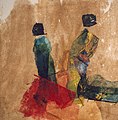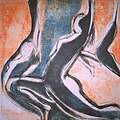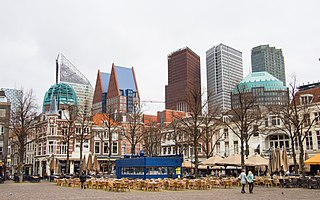
The Hague is the capital city of the South Holland province of the Netherlands. With a population of over half a million, it is the third-largest city in the Netherlands. Situated on the west coast facing the North Sea, The Hague is the country's administrative centre and its seat of government, and while the official capital of the Netherlands is Amsterdam, The Hague has been described as the country's de facto capital since the time of the Dutch Republic.

Scheveningen is one of the eight districts of The Hague, Netherlands, as well as a subdistrict (wijk) of that city. Scheveningen is a modern seaside resort with a long, sandy beach, an esplanade, a pier, and a lighthouse. The beach is popular for water sports such as windsurfing and kiteboarding. The harbour is used for both fishing and tourism.

The Hague School is a group of artists who lived and worked in The Hague between 1860 and 1890. Their work was heavily influenced by the realist painters of the French Barbizon school. The painters of the Hague school generally made use of relatively somber colors, which is why the Hague School is sometimes called the Gray School.

Gerd Arntz was a German Modernist artist renowned for his black and white woodcuts. A core member of the Cologne Progressives, he was also a council communist. The Cologne Progressives participated in the revolutionary unions AAUD (KAPD) and its offshoot the AAUE in the 1920s. In 1928 Arntz contributed prints to the AAUE paper Die Proletarische Revolution, calling for workers to abandon parliament and form and participate in worker's councils. These woodcut prints feature recurring themes of class.

Katwijk aan Zee is a seaside resort located on the North Sea at the mouth of the Oude Rijn. It is situated in the municipality of Katwijk and the province of South Holland.
Etiyé Dimma Poulsen (born 1968) is an Ethiopian-born Danish sculptor, known for her work in ceramics.

Pieter Florentius Nicolaas Jacobus Arntzenius was a Dutch painter, water-colourist, illustrator and printmaker. He is considered a representative of the younger generation of the Hague School.
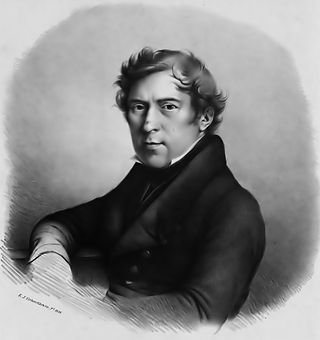
Andreas Schelfhout (1787–1870) was a Dutch painter, etcher and lithographer, known for his landscape paintings.

Wijnand Otto Jan Nieuwenkamp, was a Dutch multi-faceted autodidact. As an artist he was active as a painter, draftsman, sculptor, etcher, lithographer, and designer of book covers and of ex-libris. In addition, he was also known as a writer, architect, explorer, ethnologist and collector of East Asian art.
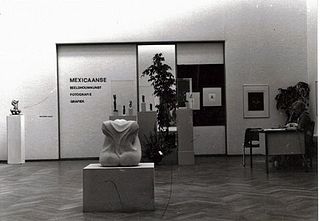
Pulchri Studio is a Dutch art society, art institution and art studio based in The Hague ('s-Gravenhage), Netherlands.
Hermanus (Herman) Berserik was a Dutch painter and print maker. He was a member of the Pulchri Studio in The Hague. He studied art at that city's Royal Academy of Art, where his teachers included Willem Schrofer, Willem Jacob Rozendaal, and Rein Draijer.

Paul Joseph Constantin Gabriël or Paul Gabriël was a painter, draftsman, watercolorist, and etcher who belonged to the Hague School.
Ans Wortel was a Dutch painter, poet and writer. She made gouaches and oil paintings, aquarelles, drawings, collages, lithographs, etchings, sculptures and glass sculptures. She was an autodidact and won the first prize at the biennale of Paris in 1963. She was one of the leading female artists of postwar Dutch modern art. There are some 50 books with contributions from or about Wortel.

Jkvr. Jacoba Berendina van Heemskerck van Beest (1876–1923) was a Dutch painter, stained glass designer and graphic artist who worked in several modern genres. She specialized in abstract landscapes and still-lifes.

Berend Strik is a Dutch visual artist working and living in Amsterdam.

Jan Cornelis Snoeck was a Dutch sculptor and ceramist.

Henricus Petrus Cornelis (Kees) Verschuren is a Dutch sculptor, painter and former lecturer at the Willem de Kooning Academie in Rotterdam, known for his monumentalist sculptures in public places in the Netherlands.
Pauline Suij was an artist who attended the Royal Academy of Art, The Hague. She belongs to the second generation of the Hague School and of Amsterdam Impressionism. She was a member of the second of these two Dutch movements of Impressionism.

Simon Moulijn was a Dutch painter, draughtsman and graphic artist. He was one of the eminent visual artists of his time and became especially well known for his lithographic works.
Jeffrey Harrod is a writer and essayist on politics and international political economy and known for his work on the power of corporations and the position of labour in international economic relations. He has been critical of global approaches which reduce the importance of nation-states. Working with Robert W. Cox a power dynamics approach to the political economy of work was developed. Harrod's application of this approach to those in low-waged or precarious employment is currently used by researchers in those fields. Since 2012 he has maintained a blog and in 2016 published his first novel, After Man.


